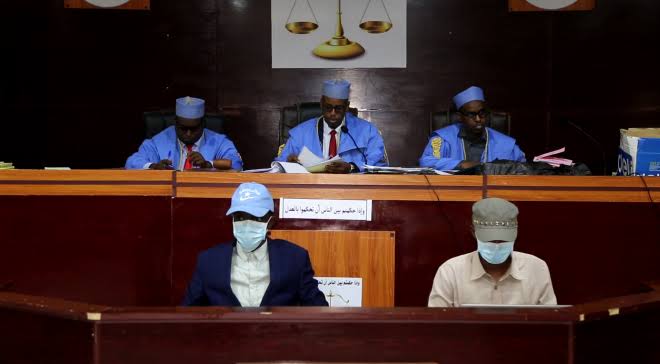Facebook Twitter (X) Instagram Somali Magazine - People's Magazine
The National Auditor of Somalia, Ahmed Iise Guutaale, has accused the judiciary of obstructing a national anti-corruption audit after multiple courts failed to acknowledge or respond to compliance review notices. While other government institutions, including the Office of the President, the Prime Minister’s Office, and both houses of Parliament, confirmed receipt of audit documents, judicial officials remained unresponsive, raising concerns about accountability and financial oversight.
The Auditor’s Office launched the judiciary audit on January 25, 2025, as part of its annual compliance review for 2024. Formal audit initiation letters were sent to the Benadir Regional Court, the Court of Appeals, and the Supreme Court to examine their financial management and legal compliance. However, after receiving no response to emails and phone calls, a delegation—including the Deputy Auditor for Investigations, the Senior Legal Advisor, and an Audit Officer—delivered the letters in person. A Supreme Court official declined to accept the documents, stating he lacked the authority to receive them.
The judiciary’s continued noncompliance led the Auditor’s Office to escalate the issue to senior government officials, including the President, the Speakers of both parliamentary houses, and the Prime Minister, on February 11, 2025. Instead of responding to the audit request, the Benadir Regional Court issued a summons for Guutaale, requiring him to appear before the court on February 16, 2025. The court cited Articles 254, 257, and 267 of the Somali Penal Code, accusing him of interfering in judicial affairs, obstructing court rulings, and blocking operational funds allocated for judicial functions. The court warned that failure to comply would result in legal consequences.
This development comes amid long-standing concerns about financial mismanagement and legal noncompliance within Somalia’s judiciary. Previous reviews exposed systemic irregularities, prompting recommendations for reform. A 2016-2017 audit uncovered financial negligence, while a 2022 Supreme Court compliance review identified further procedural violations. In July 2022, Chief Justice Bashe Ahmed Yusuf requested an audit of the Benadir Regional Appeals Court due to financial misconduct, citing unauthorized transactions. Corruption cases in 2023 led to the suspension of multiple judges, further highlighting the judiciary’s accountability challenges. A 2024 audit discovered an unauthorized judicial account with unexplained deposits of $21,922.60, raising additional concerns.
The judiciary’s refusal to cooperate with the audit has intensified public scrutiny, with some officials arguing that transparency within the legal system is crucial for national governance. Guutaale insists his office is acting within its legal mandate, while judicial officials claim the audit falls outside the Auditor’s Office’s jurisdiction. This standoff reflects broader governance issues in Somalia, where institutions often struggle with overlapping authority and political interference.
Corruption remains a major problem in Somalia, which Transparency International’s 2024 Corruption Perceptions Index ranked 179th out of 180 countries, with a score of just 9 out of 100. The country has consistently been among the lowest-ranked nations since 2007, reflecting deep-seated governance failures, weak institutions, and a lack of political will to combat corruption. Despite initiatives like the establishment of the Office of the Auditor General in 2014 and the Public Procurement, Concessions, and Disposal Act, enforcement remains weak. Political interference and systemic corruption continue to undermine transparency efforts.
The judiciary’s resistance to the audit has sparked debate over the need for stronger oversight mechanisms. Some officials argue that additional measures should be implemented to enforce compliance, including legislative reforms to grant auditors more authority. Critics warn that without proper oversight, corruption within the judiciary could further erode public trust in Somalia’s legal system.
The ongoing standoff between the Auditor’s Office and the judiciary highlights the broader challenges Somalia faces in its fight against corruption. The failure of key institutions to cooperate with accountability measures could hinder efforts to improve governance and economic stability. As the dispute escalates, political leaders will be under pressure to address the impasse and ensure that Somalia’s legal institutions adhere to transparency and accountability standards.

